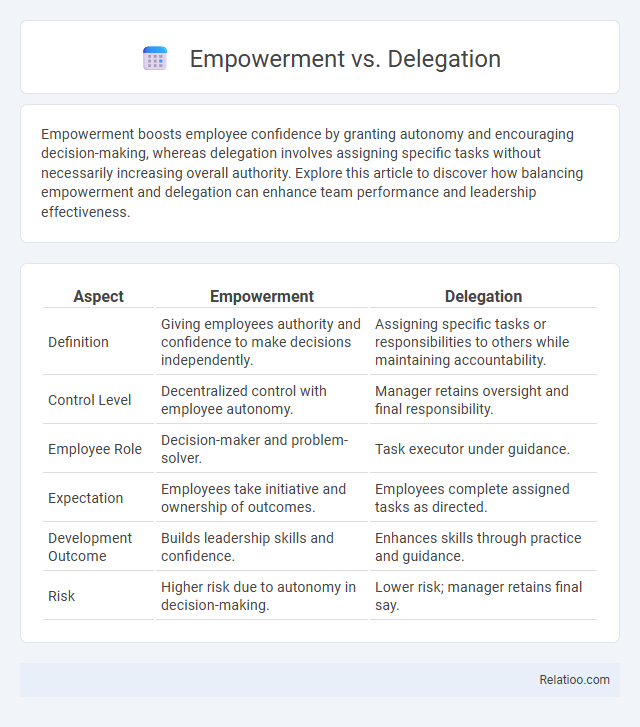Empowerment boosts employee confidence by granting autonomy and encouraging decision-making, whereas delegation involves assigning specific tasks without necessarily increasing overall authority. Explore this article to discover how balancing empowerment and delegation can enhance team performance and leadership effectiveness.
Table of Comparison
| Aspect | Empowerment | Delegation |
|---|---|---|
| Definition | Giving employees authority and confidence to make decisions independently. | Assigning specific tasks or responsibilities to others while maintaining accountability. |
| Control Level | Decentralized control with employee autonomy. | Manager retains oversight and final responsibility. |
| Employee Role | Decision-maker and problem-solver. | Task executor under guidance. |
| Expectation | Employees take initiative and ownership of outcomes. | Employees complete assigned tasks as directed. |
| Development Outcome | Builds leadership skills and confidence. | Enhances skills through practice and guidance. |
| Risk | Higher risk due to autonomy in decision-making. | Lower risk; manager retains final say. |
Understanding Empowerment: Definition and Core Concepts
Empowerment involves granting individuals the authority, confidence, and resources to make decisions and take ownership of their tasks, fostering autonomy and intrinsic motivation. Unlike delegation, which assigns specific tasks or responsibilities without necessarily transferring decision-making power, empowerment focuses on enabling employees to act independently and innovate within their roles. Understanding empowerment means recognizing its core concepts: trust, accountability, and support, which collectively enhance your team's engagement and productivity.
What is Delegation? Key Principles Explained
Delegation is the process of assigning specific tasks or responsibilities from a manager to a subordinate while retaining overall accountability for the outcome. Key principles of effective delegation include clear communication of expectations, matching tasks to the delegatee's skills, and providing necessary resources and authority. Understanding delegation enables you to optimize team productivity and develop your team's capabilities.
Core Differences Between Empowerment and Delegation
Empowerment involves granting You the authority and confidence to make decisions independently, fostering ownership and accountability, while delegation primarily means assigning specific tasks or responsibilities without transferring the underlying decision-making power. Core differences include empowerment's focus on enhancing skills and autonomy, whereas delegation centers on distributing workload efficiently. Empowerment encourages initiative and innovation, contrasting with delegation's structured oversight and control.
Benefits of Empowerment in the Workplace
Empowerment in the workplace enhances employee motivation, leading to increased productivity and job satisfaction by granting individuals autonomy and decision-making authority. Unlike delegation, which assigns specific tasks, empowerment fosters a culture of trust and innovation, encouraging employees to take ownership and proactively solve problems. This dynamic not only improves team collaboration but also drives organizational growth through strengthened engagement and accountability.
Advantages and Limitations of Delegation
Delegation enhances efficiency by distributing tasks to team members with appropriate skills, allowing You to focus on strategic priorities and develop others' capabilities. It improves time management and accountability but may face limitations such as inconsistent performance, communication gaps, and potential resistance from employees. Effective delegation requires clear instructions, trust, and monitoring to overcome challenges and maximize productivity.
When to Empower vs. When to Delegate
Empowerment is best applied when team members require autonomy to develop skills and take ownership of outcomes, fostering innovation and long-term growth, whereas delegation suits tasks that are well-defined and require specific execution without necessitating decision-making authority. Empower when the goal involves enhancing employee confidence, motivation, and accountability; delegate when clarity and control over task completion are priorities. Balancing empowerment and delegation based on task complexity and desired employee development ensures optimal productivity and engagement.
Leadership Styles: Impact on Empowerment and Delegation
Leadership styles significantly influence how empowerment and delegation are practiced within organizations, affecting employee motivation and performance. Transformational leadership enhances empowerment by fostering autonomy, innovation, and trust, while transactional leadership often relies more on delegation through structured tasks and clear directives. Servant leadership uniquely combines empowerment and delegation, prioritizing employee growth and shared responsibility, ultimately driving higher engagement and accountability.
Building a Culture of Empowerment
Building a culture of empowerment requires shifting focus from mere delegation to fostering true empowerment, where employees are encouraged to take initiative and ownership of their tasks. Your leadership should prioritize clear communication, supportive resources, and trust to enable your team to make decisions and innovate confidently. Emphasizing empowerment over delegation drives higher engagement, accountability, and sustained organizational growth.
Common Pitfalls When Delegating Tasks
Common pitfalls when delegating tasks include unclear instructions that confuse your team, lack of accountability that hinders progress, and failing to provide the necessary resources or support to complete tasks effectively. You may also encounter micromanagement tendencies that undermine empowerment and decrease motivation. Avoiding these issues ensures successful delegation while fostering empowerment and ownership among team members.
Best Practices for Balancing Empowerment and Delegation
Balancing empowerment and delegation requires clear communication of roles and responsibilities, ensuring team members understand their authority and decision-making boundaries. Best practices include setting measurable goals, providing resources and support, and maintaining accountability without micromanaging. Empowering employees while delegating tasks effectively fosters autonomy, enhances motivation, and drives performance.

Infographic: Empowerment vs Delegation
 relatioo.com
relatioo.com